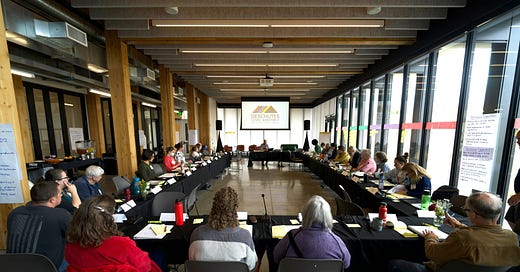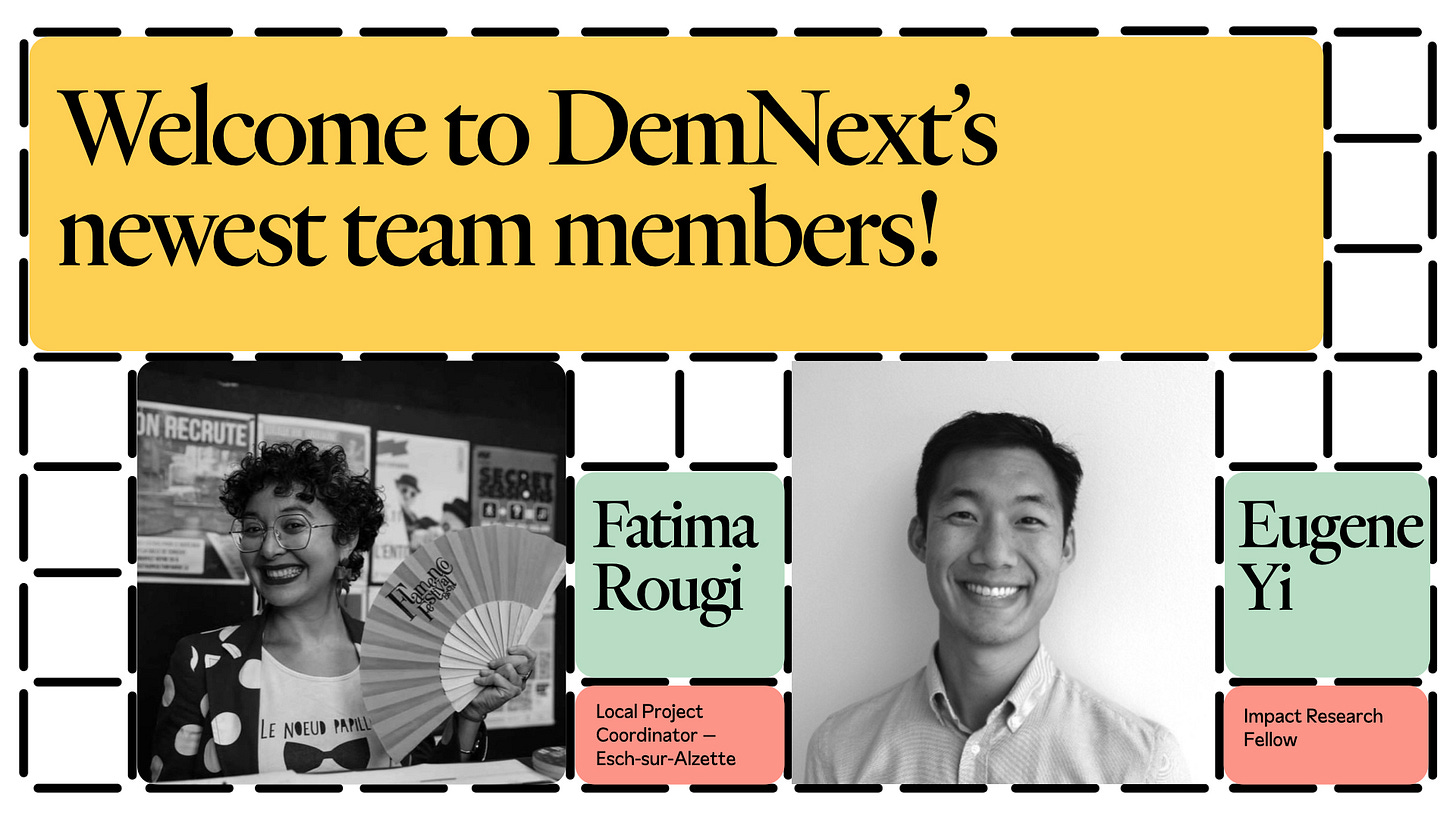🗳️What has the US election campaign taught us about elections?
A year of political drama leaves us roughly where we started
So here we are again. Another US election campaign is winding up and, to us at least, the smoke and noise seems to leave Americans in a similar place as in 2020.
The two rival factions are still neck and neck after a campaign that was short on constructive debate and long on repetitive, personal insults. The cost is still staggering (at least $12 billion raised by all candidates so far). More than 80% of Americans think there is no reason to change their minds when money rules out ordinary people running for office, that parties are more interested in fighting each other than governing, and that special interest groups hold too much sway. Trust in government remains at historic lows.
With US voters long equally divided and one-third of the electorate likely to stay away from the polls, we feel confident in predicting that more than half of the population will wake up on 6 November to an incoming president who either doesn't interest them, or, most likely, whom they actively oppose.
One podcaster following the hustings summarised the popular feeling: "People hate politicians!" reporter Katty Kay said on the Rest is Politics US.
We at DemocracyNext wish it was otherwise and are trying to do something about it.
The campaign has only strengthened our belief that all citizens should play an active part in setting the policies that govern all aspects of our lives. That's why we are doing all we can to support new ideas to upgrade democracy with citizens' assemblies – spaces for creative problem solving. Three key ideas make them different to both electoral politics and most participatory approaches out there: 1) the ancient practice of sortition – randomly selecting decision makers; 2) deliberation – collectively weighing evidence as the basis for shared decision making; and 3) the rotation of power – we take turns with the privilege and responsibility of decision making.
Change can happen. As the dismal carnival of the campaign continued, we took great courage from witnessing the latest pioneering citizens' assembly in the US. The Deschutes Civic Assembly is just one more small, but mightily impressive, step showing that everybody has the agency, dignity, and capacity to learn, overcome polarising prejudices, and come up with common sense policy proposals.
Dissatisfaction with the status quo isn't unique to America, and perhaps it is spreading to the elite as well. Our Advisory Council member Hugh Pope, a devotee of the Rest is Politics podcast and its parade of celebrity politicians and global pundits, found that many are now ready to say that "the system is broken."
Hugh's recent post on Lessons in Governance from "The Rest is Politics" podcast highlights these new moments of political self-criticism. Former UK deputy prime minister Nick Clegg, for instance, warned that current electoral representation creates leaders who are too sleepless to take proper decisions, a parliament that is "a pastiche of a Harry Potter boarding school" and a "system [that] needs to be shaken to the core."
François Hollande, a former president of France, spoke of his worries that young people no longer want to go into politics, that money trumps all, and that "in France, the political system is broken."
And that's before we get to the podcasters themselves. Ex-politician and writer Rory Stewart calls politicians "grotesquely disqualified" and said lawmakers "never scrutinised anything." Alastair Campbell, a key aide to British former prime minister Tony Blair, believes that "radical, fundamental change is needed."
But what should that change be? More checks, balances, and transparency, and just hope that a new elected official will do something none of their predecessors could? A move to proportional representation, and put all our trust in political parties?
Or could the future lie in tackling the system itself, for instance, by transitioning to a new system of deliberative democracy with citizens’ assemblies?
The podcasts do give us some hope for that. Some politicians, shocked by the increasing gap between themselves and the public, may even help along the way. But the ex-governor of California Arnold Schwarzenegger warns us not to count on it. Paraphrasing Albert Einstein, he said: "The same mind that created the problem is not able to solve it."
👋 Comings and goings at DemNext
🎉 Welcome to DemNext's newest team members - Eugene Yi and Fatima Rougi!
Eugene is joining us as an Impact Research Fellow to develop and implement an evaluation framework to assess the success of deliberative systems, and how technology plays in to support and enhance them.
Fatima is joining us part time as a Local Project Coordinator in Esch-sur-Alzette, Luxembourg, where she will be helping us to make connections with civil society and key stakeholders in the lead-up to Esch's Citizens' Assembly being established next year.
You can find their bios on our team page. We're looking forward to working together with both of you!
We also say goodbye to our former Communications Director Ansel Herz; we are grateful to have worked together for the past two years and wish you all the best on your next adventures!
🍂 Upcoming events and collaborations this autumn
November
6th: Our Cities Lead James MacDonald-Nelson is speaking at the World Urban Forum 12 Egypt in Cairo. He’ll be sharing about our work at DemNext on democratising urban planning with citizens’ assemblies. Check out our Cities Programme here!
6th: Register here to join our Senior Adviser Ieva Česnulaitytė who is joining a Building a New Reality webinar to discuss "True Representation" in citizens' assemblies alongside two experts in the US.
13th: Sign up to join DemocracyNext and New America for a briefing about the Deschutes, Oregon citizens' assembly on youth homelessness held in September-October. We will also discuss the technological innovations that enhanced this assembly. 1-2pm ET.
13th: Sign up here to hear Denmark's Zakia Elvang speak about The Future of Democracy, particularly as it relates to how deliberative techniques can deal with polarisation. 3.00-4.30pm CET.
21st: Publication of DemocracyNext's Senior Adviser Ieva Česnulaitytė's new paper on "A New Democratic Response to Authoritarianism in Central and Eastern Europe", which tracks the encouraging new wave of citizens' assemblies in the region. Register here to join Ieva and our expert guests to hear more about her findings at 10.00am ET | 4.00pm CET | 5.00pm EEST.
📡 What’s on our radar
🎧 Listen to DemocracyNext Founder/CEO Claudia Chwalisz talk to Jenny Stefanotti on the Denizen podcast
📻 Tune in to Christian Mastrodonato's Engines of Creation podcast to hear Claudia Chwalisz discuss innovation in deliberative democracy, particularly enhancement by technology
👀 Read Guardian columnist John Harris advocate (20 October) eloquently for the use of citizens assemblies, particularly in a complex moral debate like end of life.
🔬 We loved Laura Spinney's cover article in The New Scientist (2 October) on the state of deliberative democracy.
🏘️ Last but not least, a fine account by Masha Hamilton for the Rockefeller Foundation about the impact of the Deschutes Civic Assembly on Youth Homelessness. One assembly member told her the experience "gives me hope that people came from all walks of life to figure this out together.”








After listening
Dear Mr Hollander,
The political system is not broken for those in charge unless the damage it does causes them problems such revolutions, invasions, lose of earning etc
The democratic system is because of how it is corrupted. This is the evidenced viiew of the electorate and wider population.
The hierarchical control of elected government is suppressing what can save it. Deliberative Democracy
Please add the listen to article option.
Now I shall find your email and copy paste to text to voice app.